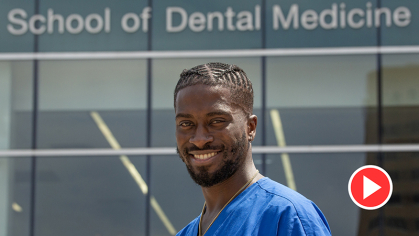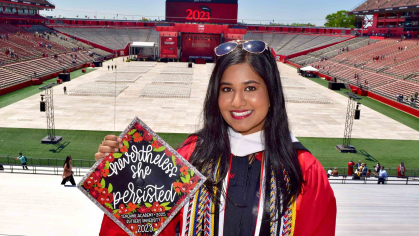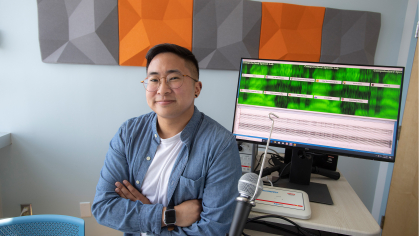Senior Finds His Niche Designing Websites at Rutgers
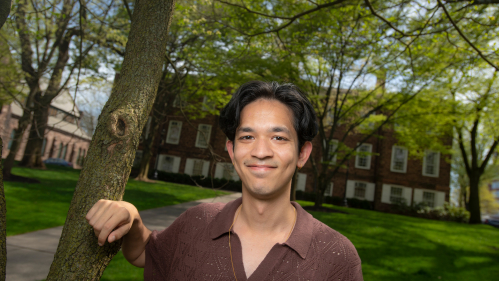
Thaquib Ahammed arrived at Rutgers not knowing where his future would take him. Yet it didn’t take long before he discovered his niche in the world of website development.
In the spring of his first year, Ahammed began designing a website for the Louis Stokes Alliance for Minority Participation (LSAMP) at Rutgers, an organization working to increase the number of underrepresented students who graduate in a STEM (Science, Technology, Engineering and Math) field.
At the time, Ahammed, a double-major in computer science and cognitive science, was not only a member of LSAMP but was also a work-study student for Chelsie Riche, then the campus coordinator for the organization who was leading the website project.
“I had the vision but I just shared the vision and he made it happen,” says Riche, now the assistant director for student success and experiential education at the Office of the Executive Vice President for Academic Affairs. “He went about creating his own coding to highlight the students in the program in a way that made sense.”
Since that project, Ahammed has built websites for two other programs on campus: Rutgers IDEA (Innovation, Design & Entrepreneurship Academy) and the NJ Wind Institute Fellowship Program at Rutgers University. In each case, Ahammed developed coding to tailor the design of the website to the program’s needs.
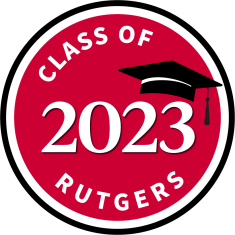
Working on the NJ Wind Institute website was one of the highlights of his work at Rutgers, Ahammed says, because he was developing a site for a brand-new organization. “I worked with them promoting a very new and up-and-coming program for students,” he says. “I was seeing this thing grow right from the beginning.”
Ahammed’s interest in website development began when he took an Advanced Placement course in computer science at his high school in Old Bridge, N.J. When it came time to decide on a university, the first-generation college student chose Rutgers because of the research experience it offers to undergraduates.
Another factor that drew him to Rutgers was his family’s ties to the university. Five of his cousins now attend Rutgers, and his brother, Tajim Ahammed, a consultant for a health technology company, is an alumnus. “I like to say that my whole family is just a Rutgers family,” Thaquib says.
After choosing to study computer science in the School of Arts and Sciences, Ahammed later added cognitive science as a second major because he was intrigued by the overlap between the two fields. He also wanted to study the psychological and neurological aspects of the two disciplines and how they often work together.
At Rutgers, Ahammed found a stepping stone into research through the LSAMP program, which provides mentoring to students from historically underrepresented groups. His research work began the summer after his first year, when he became an intern with Janice Gobert, an educational psychology professor who was developing a scientific educational app that allowed students to work on virtual labs. During the summer, Ahammed learned how to script natural language processing code so that the app could grade quizzes students took in the online labs.
I like to say that my whole family is just a Rutgers family.
Thaquib Ahammed
He landed a second internship the summer after sophomore year with a research group led by Srinivas Narayana, an assistant professor of computer science. Working with other students, Ahammed learned how innovative technologies such as Kubernetes, a software tool used for scaling and automizing applications, could be applied to various university services.
Ahammed considers Narayana the most influential faculty member in his undergraduate education at Rutgers. “He pushed me to learn very current industry practices and he guided me on a lot of the new technologies,” he says. “He was the one who said, ‘Continue to learn these.’”
His two research experiences on campus led to a software engineering internship with the Internal Tools Team at Comcast Corp. last summer. One of the projects Ahammed collaborated on was developing an online dashboard that enabled company employees to pinpoint data about devices across the Comcast network.
“It was very eye-opening and just a very good learning experience,” he says. “My team was very small but the code repository that we had to update was very large.”
Ahammed, who hopes to find a position in the tech industry after graduating, also views his work-study position at Rutgers as an invaluable experience because it allowed him to develop his skills in coding, programming and communicating with clients.
“I’ve been able to work with a lot of different types of organizations, cater to their needs, develop their website and communicate with people continually,” he says. “That’s what’s been the most rewarding.”
